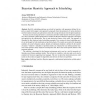Free Online Productivity Tools
i2Speak
i2Symbol
i2OCR
iTex2Img
iWeb2Print
iWeb2Shot
i2Type
iPdf2Split
iPdf2Merge
i2Bopomofo
i2Arabic
i2Style
i2Image
i2PDF
iLatex2Rtf
Sci2ools
121
click to vote
INFORMATICALT
2002
2002
Bayesian Heuristic Approach to Scheduling
Abstract. Real life scheduling problems are solved by heuristics with parameters defined by experts, as usual. In this paper a new approach is proposed where the parameters of various heuristics and their random mixtures are optimized to reduce the average deviations from the global optimum. In many cases the average deviation is a stochastic and multi-modal function of heuristic parameters. Thus a stochastic global optimization is needed. The Bayesian heuristic approach is developed and applied for this optimization. That is main distinctive feature of this work. The approach is illustrated by flow-shop and school scheduling examples. Two versions of school scheduling models are developed for both traditional and profiled schools. The models are tested while designing schedules for some Lithuanian schools. Quality of traditional schedules is defined by the number of teacher "windows". Schedules of profiled schools are evaluated by user defined penalty functions. That separat...
Related Content
| Added | 22 Dec 2010 |
| Updated | 22 Dec 2010 |
| Type | Journal |
| Year | 2002 |
| Where | INFORMATICALT |
| Authors | Jonas Mockus |
Comments (0)

